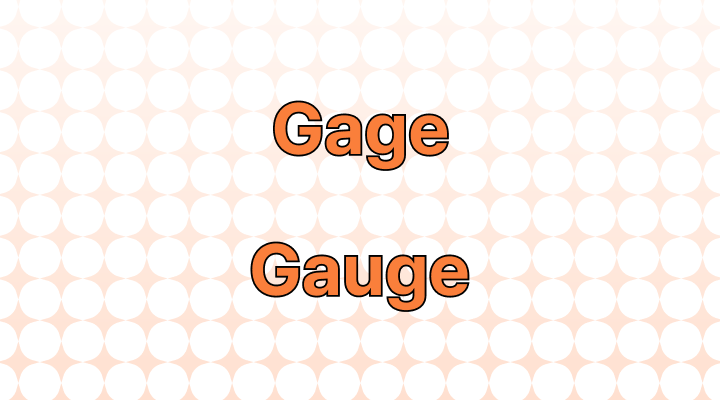A gauge is a measuring instrument, while gage is a less common spelling of "gauge" and can also refer to a pledge.
The words gage and gauge are homophones, which means they sound the same but have different meanings and spellings. Understanding their distinctions is essential for clear communication. Let's delve into their meanings, differences, and provide ten example sentences to illustrate their usage.
What does gage mean?
- Gage is a less common word that primarily means a pledge or a token of something.
- In archaic contexts, it could also refer to a challenge or defiance.
Example sentences:
Gage (as a noun):
- He gave her a flower as a gage of his affection.
- The knight left his shield as a gage of his bravery.
- The old poem speaks of gages exchanged between lovers.
Gage (archaic):
- In the medieval tales, knights often threw down their gages to challenge each other to duels.
- The declaration was seen as a gage of war, and tensions rose.
More example sentences
- He used a depth gage to measure how deep the well was.
- The jeweler carefully examined the gage of the gold wire.
- She asked her friend to be the gage of her loyalty by keeping her secrets.
- The carpenter relied on his trusty gage to ensure precise measurements for the project.
- As a weather enthusiast, he always carried a barometric gage to monitor atmospheric pressure.
- The chef used a meat gage to check the internal temperature of the roast.
- The detective found a mysterious gage at the crime scene, hinting at a hidden clue.
- The seamstress selected the appropriate thread gage for sewing the delicate fabric.
- To ensure the perfect fit, the tailor used a body gage to measure the client's dimensions.
- He couldn't find his tire pressure gage and had to borrow one from his neighbor to check his car's tires.
What does guage mean?
- Gauge is a more common term and serves as a noun or a verb.
- As a noun, it refers to an instrument or a device used to measure, evaluate, or determine something, such as the thickness, size, quantity, or level of an object or substance.
- As a verb, gauge means to measure or assess something using a gauge.
Example sentences:
Gauge (as a noun):
- The pressure gauge on the boiler indicates a dangerous level.
- She used a tire gauge to check the air pressure in her car's tires.
- The fuel gauge in the car shows that we need to refill soon.
Gauge (as a verb):
- Can you gauge the temperature of the water using this thermometer.
- We need to gauge the depth of the river before attempting to cross.
More example sentences
- The mechanic used a pressure gauge to measure the tire pressure accurately.
- She needed to gauge the depth of the river before attempting to cross it.
- The thermometer is an essential tool to gauge the temperature outside.
- It's difficult to gauge the true impact of this new policy on the economy.
- To assess the level of interest, we can use social media engagement as a gauge.
- The teacher used a rubric to gauge the quality of each student's essay.
- The survey was designed to gauge public opinion on the upcoming election.
- The pilot checked the fuel gauge before taking off to ensure there was enough fuel for the journey.
- The professor used class participation as a gauge of students' understanding of the material.
- The artist used a color gauge to ensure consistency in the hues of the painting.
Common idioms/phrases
- Throw down the gage (or gauntlet): This phrase means to issue a challenge or invitation to a contest, often a duel or a battle. The word "gage" is sometimes used in older texts, but today, "gauntlet" is more commonly used. For example, "He threw down the gauntlet and challenged his rival to a debate."
- Gauge the situation: While not an idiom per se, this phrase means to assess or measure a situation or condition to make informed decisions. For instance, "We need to gauge the situation before we decide on our next course of action."
- Gauge someone's reaction: Again, not an idiom but a phrase used to describe the act of assessing how someone responds to a particular situation or information. For example, "She carefully gauged his reaction when she told him the news."
- Read someone's emotional gauge: This phrase means to understand or interpret someone's emotional state or mood. It's not a common idiom but can be used figuratively. For instance, "I could read her emotional gauge and knew something was bothering her."
In summary, "gage" is a less common word that primarily means a pledge, token, or challenge, while "gauge" is a more widely used term that can be both a noun and a verb related to measurement and assessment. Understanding the appropriate context for each word is crucial for effective communication.
Discover more about the AI English proofreader, Engram!

Reference














